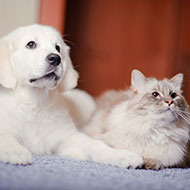
List hailed a ‘major milestone’ in efforts to support global drug availability
The World Small Animal Veterinary Association (WSAVA) has published the world's first list of essential medicines for cats and dogs in a bid to support global drug availability.
Compiled by the association’s Therapeutics Guidelines Group (TGG), the list aims to support companion animal vets in regions of the world who lack access to even the most fundamental medicines. It includes both core and complementary essential drugs listed alphabetically by category or organ system/speciality.
The extensively peer-reviewed list will be updated every three years. The WSAVA hopes this will boost the standard of care that veterinary surgeons can offer their patients worldwide and facilitate the regulatory oversight of medicines included on the list.
“Many of our global colleagues lack access to even essential drugs, such as opioid analgesics,” explained Dr Paulo Steagall, co-chair of the TGG. “This limits their ability to treat pain in their patients, leading to unnecessary suffering and compromising animal welfare.
“But it’s not just their patients that suffer. Our members and their colleagues experience deep frustration as they are unable to provide the standard of veterinary care they have been trained to deliver. For a profession already facing serious mental health problems, this is an unnecessary additional burden.”
In 2016, a survey of WSAVA’s 113 companion animal veterinary member associations revealed that 75 per cent faced obstacles accessing vital medicines. The WSAVA believes this is a longstanding issue that also affects colleagues working with production animals and human medics.
To help raise awareness of this issue, the WSAVA released two position statements in 2016 that were co-signed by numerous other international veterinary associations and trade bodies. It also created the TGG in 2018 to spearhead its work and safeguard the adoption of best-practice in adopting and using veterinary pharmaceuticals.
“As a global association, committed to advancing the health and welfare of companion animals worldwide, resolving the long-standing problem so many of our members face in accessing fundamental medicines is one of our most important priorities,” commented WSAVA president Dr Shane Ryan.
“We congratulate members of our TGG who have worked very hard to produce this comprehensive resource which is the next step in our campaign to secure access for all veterinarians to the drugs to they need to care for their patients.”



 The Veterinary Medicines Directorate (VMD) is inviting applications from veterinary students to attend a one-week extramural studies (EMS) placement in July 2026.
The Veterinary Medicines Directorate (VMD) is inviting applications from veterinary students to attend a one-week extramural studies (EMS) placement in July 2026.